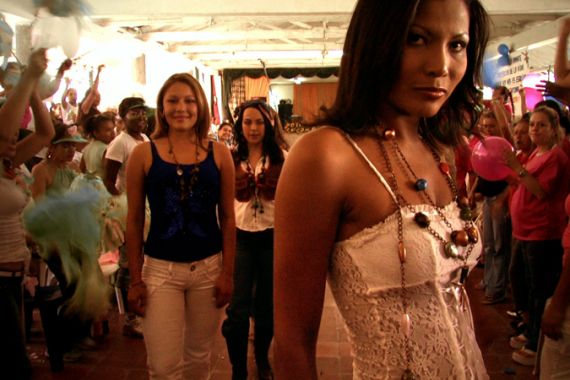
Beauty Behind Bars
Can a beauty contest restore the dignity and hope of Colombian women put behind bars because of drugs and violence?
Editor’s note: This film is no longer available online.
From the wreckage of Pablo Escobar’s Medellin comes an intimate portrait of life inside a Colombian women’s prison. In a unique fight for redemption we see how the prison’s leadership creates an outlet for their feminine energy and sense of individual identity.
Keep reading
list of 4 itemsInside the pressures facing Quebec’s billion-dollar maple syrup industry
‘Accepted in both [worlds]’: Indonesia’s Chinese Muslims prepare for Eid
Photos: Mexico, US, Canada mesmerised by rare total solar eclipse
Beauty Behind Bars is a sweet and unflinching film about the past, present, and dreams for the future of these inmates. We are immersed in two distinct views of life in this prison.
One view is from the perspective of Diana. Convicted for murder she is unrepentant about her crimes but anxious about how her young daughter will judge her. And Angie, who, as an ex-model, becomes committed to bringing these women an outlet for their creativity and humanity.
FILMMAKER’S VIEW
By Jared Goodman
I am friends with a murderer. Several, actually. I never thought I could say this about someone who has killed in cold blood, but through the process of making Beauty Behind Bars I have learned first-hand about the duplicity of mankind. It is amazing how some women in the Buen Pastor Prison in Medellin, Colombia can be so sweet and adorable in one moment, and in the next be so cruel and hateful that you hardly recognise them.
From the very beginning, it was this theme that compelled me to make this film. I saw a true modern day Jekyll and Hyde story and I wanted to explore it. Do these women deserve to be incarcerated? Yes. Have they done horrible things? Absolutely. Do they have some admirable qualities? Yes, they do.
It is my hope that the stories we tell in Beauty Behind Bars embody this contradiction. I want the audience to experience what I experienced. I want them to relate to these women and understand them, and then when they find out about the horrible crimes that they have committed, I want the audience to wrestle with all the same thoughts and emotions that I felt.
A documentary film is almost entirely dependent on perspective. Something as simple as turning a camera on and off can dramatically change how “reality” is exhibited. With this in mind, the most honest way I can tell this story as a director is by doing my best to translate all the feelings that I experienced while I was in Colombia making this film. The feelings were intense, provocative and enlightening to say the least.